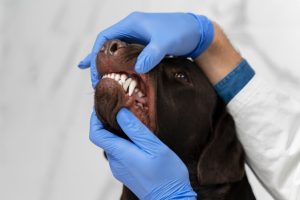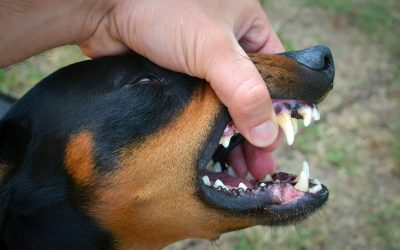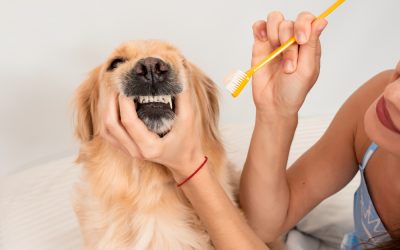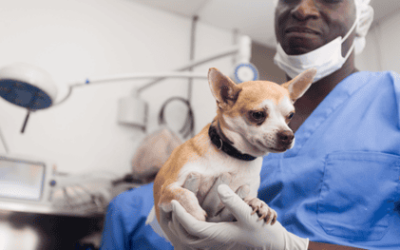Dog Tooth Extraction Cost With and Without Pet Insurance
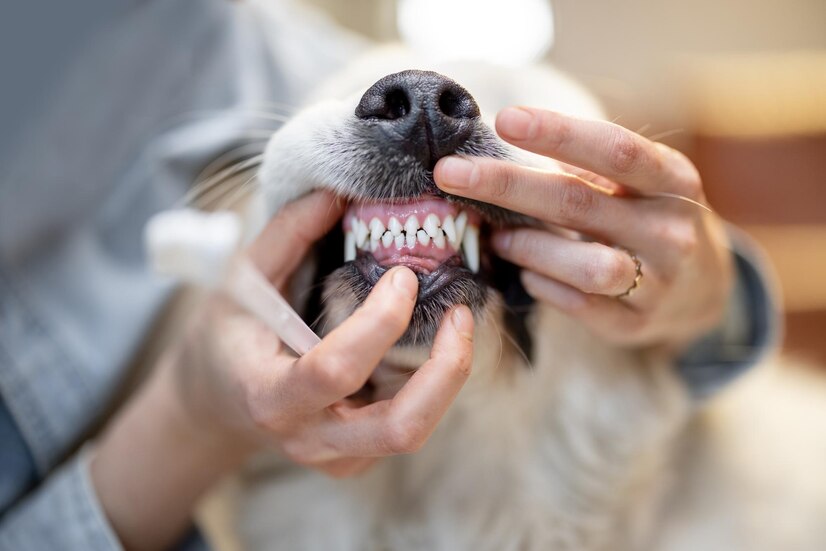
Like humans, dogs can suffer from dental issues, including periodontal disease, abscesses, and tooth decay. Neglecting these problems can have serious effects, including pain, trouble eating, and infections that can harm the organs.
Regular dental checkups, proper brushing, and professional cleanings are essential preventative measures. However, in some cases, we must extract teeth. This can relieve pain and prevent complications.
Tooth extraction is common in dogs. It removes diseased or damaged teeth, preventing infection and improving oral health. The procedure may seem daunting, but knowing the costs can help you decide what’s best for your pet’s well-being.
What is dog tooth extraction?
Dog tooth extraction is a surgery performed by a vet or veterinary dentist. This procedure removes one or more teeth from the dog’s mouth under general anesthesia. It is recommended for a severely damaged, decayed, or painful tooth.
There are several reasons why a dog may require tooth extraction, including:
- Periodontal disease is a common dental issue in dogs. It causes inflammation and infection of the gums and supporting structures around the teeth. If left untreated, it can lead to tooth loss.
- Tooth fractures or trauma: Accidents can crack, break, or dislodge teeth. They may need to be extracted.
- Tooth root abscesses are painful infections at the tooth’s root. They often require extraction to prevent the spread of infection.
- Retained baby teeth: Sometimes, a dog’s baby teeth don’t fall out. This can cause crowding and misalignment, which may require extraction.
- Oral tumors or cysts: Growths in the mouth can sometimes affect the teeth, making extraction necessary.
Factors that affect the cost of dog tooth extraction
The cost of dog tooth extraction can vary significantly depending on several factors. Understanding these variables can help you budget and prepare for the procedure. Here are some of the key factors that influence the cost:
- Location: The cost of veterinary services, including dental work, varies by location. Urban areas and high-cost regions have higher veterinary fees than rural ones.
- Veterinary clinic or hospital: The facility’s type can affect the cost. Specialty veterinary dental clinics may charge higher fees. This is due to their specialized equipment, skilled staff, and high overhead costs.
- Number of teeth extracted: The more teeth that need to be extracted, the higher the cost will be. Extracting multiple teeth typically takes more time and effort from the vets.
- Some tooth extractions may be more complex than others. It depends on the tooth’s location, root structure, and possible issues. Complex cases may need more time or special equipment. They may even require a referral to a veterinary dental specialist. This will increase the overall cost.
- Pre-operative tests and diagnostics: Your vet may recommend tests. These include blood work, X-rays, or dental radiographs. This depends on your dog’s age, health, and the procedure. These additional tests can add to the overall cost.
- Anesthesia and pain management: Dogs usually need general anesthesia for tooth extractions. The cost of anesthesia and pain meds can add to the total.
- Post-operative care and medications: After the procedure, your dog may need pain meds, antibiotics, or other meds to recover and prevent infection. These additional costs should be factored into the overall expense.
Average costs of dog tooth extraction with and without anesthesia
The cost of dog tooth extraction varies greatly. It depends on if the procedure is done with or without general anesthesia. It may be tempting to choose a non-anesthetic extraction to save money. But it’s not recommended. It can be risky and uncomfortable for your furry friend.
Tooth extraction with anesthesia
Most vets recommend general anesthesia for tooth extractions. It keeps your dog safe and pain-free during the procedure. Dog tooth extraction with anesthesia can cost $300 to $2,500 or more. It depends on the number of teeth, the procedure’s complexity, and the location.
How Can Odie Pet Insurance Help You if Your Dog Needs Tooth Extraction?
Pet insurance can be a valuable tool in managing the costs of treating a dog’s veterinary expenses. By having a pet insurance policy in place, you can have peace of mind knowing that you can provide medical care for your furry companion without worrying about the financial burden. Pet insurance can help cover the costs of veterinary consultations, diagnostic tests, medications, and even specialized treatments if required.
What Does Odie Pet Insurance Cover When It Comes to Toothth Extractions?
Extractions for all teeth due to traumatic dental fractures, periodontal disease, and other oral traumas are covered by Odie as long as they are not caused by repetitive inappropriate chewing behavior that presented signs or symptoms before the Policy Effective Date or the expiration of any Waiting Period.
Odie covers unexpected illnesses and injuries related to dental treatments as long as the pet has no pre-existing dental conditions and the pet parents routinely care for their pets’ dental hygiene. Many regulations are involved here, and the policy owner should refer to their policy documents for specifics.
More About Odie Pet Insurance Plans
Pet insurance covers various veterinary expenses, providing financial protection and peace of mind for pet owners. Here are the details of the coverage options offered by Odie Pet Insurance:
Illness & Injury Plan
The Illness & Injury Plan is designed to cover a wide range of medical needs for your pet. This plan includes comprehensive coverage for various illnesses, injuries, and veterinary services. Some of the covered items include:
- Veterinary exams and consultations
- Diagnostics (e.g., X-rays, lab tests)
- Prescribed medications
- Surgeries and hospitalization
- Rehabilitation, acupuncture, or chiropractic treatments
- Medically necessary supplies
The Wellness Plan
The Wellness Plan is a monthly membership that focuses on preventive care and covers routine veterinary services.
- Provides reimbursements for routine care items, including wellness visits (exams and vaccines), testing and parasite prevention, dental cleanings and at-home dental care, vitamins, supplements, and more.
- Through Odie’s partnership with Petivity, a leader in smart pet products and proactive care, Wellness Plan members can also receive reimbursements for Petivity devices and health kits, as well as eligible Purina food and supplements.
- Total reimbursement up to $700 per year.

